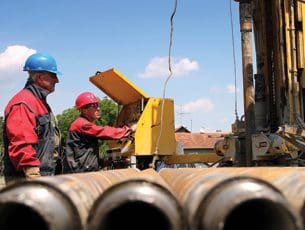The oil and gas industry is driving an expansive segment of the economy, not just here in Texas, but throughout the United States. Rising production within the industry is providing a massive amount of new jobs and revenues in a trickle-down style.
A builder in Rockport, on the Texas coast, explained the other day that the Eagle Ford Shale is having a large impact on the homebuilding industry. Many of his workers are departing their $15-an-hour construction jobs for $25-an-hour-plus wages in the energy fields.
As a result, these working men and women are enjoying an impressive gain of $20,000 or more per year in their paychecks, thus allowing them to experience a higher quality of life. They are providing greater financial security for their families.
In addition, the royalty owners in the Eagle Ford Shale, along with those in the Permian, Bakken, Marcellus and all the rest, are receiving income they had only seen previously in movies – truly far beyond their wildest dreams. They are buying new trucks, new homes, second homes, and sending children to college who may not have had such opportunity without those royalty checks.
A rising tide raises all ships, so businesses throughout these shale plays, from restaurants and motels to gas stations and retailers, reap benefits from prosperous oil and gas development and production.
According to API, Texas could do even better, adding up to almost 41,000 new jobs and well over $5 billion to the state economy in just six more years if federal restrictions on American crude exports are lifted. The study projects that at least nine states could each receive state economic gains of $1 billion or more in 2020, and 18 states could each add 5,000 new jobs with crude oil exports.
This is a far cry from five years ago, when the country did not give much consideration to exporting. Now that the U.S. oil production has grown faster than any other portion of the world, and our domestic oil consumption is declining, our bright future lies in exporting not only crude oil to other nations, but also refined end products such as gasoline and diesel.
And the growth is not limited to crude oil. The future of gas exports remains largely untapped with the potential for liquefying and shipping domestic natural gas to foreign markets. Once such doors open, we could face endless sources of growth for years – even decades to come.
There will be several winners of this insightful move:
- Local communities will become more vibrant business drivers with energy producers working in their areas – some small towns that may have been on the verge of disappearing are now becoming thriving hubs of economic prosperity;
- Energy companies have proven to be generous supporters of their local non-profit organizations, from local schools and junior livestock shows to youth athletics, libraries, senior centers, and the United Way;
- Local governments benefit from drilling as many profit from master plan land-use taxes generated from oil and gas production;
- Local and state governments will generate additional tax revenue that will benefit their ability to provide vital services and enhance quality of life for residents;
- States collect taxes on property, sales, production and the franchise tax, not counting indirect items such as taxes on motor fuels. In 2012 alone the State of Texas received approximately $12 billion in taxes from the oil and gas industry;
- Royalty owners will be able to enjoy higher quality of life, as mentioned earlier; and
- The United States raises its profile as the major player within the international oil and gas world – no longer allowing Middle East countries to monopolize and dictate prices;
The American Petroleum Institute’s study predicts that exporting crude oil will lower gasoline price while growing domestic jobs, and we all know this level of activity will improve our local communities.
Studies continue to show that states playing home to oil and gas drilling in major shale plays are outperforming those without robust energy development. Pro-drilling political climates that encourage energy exploration and investment have led to strong tax bases, economic prosperity and the security of having a reliable source of energy domestically.
Rising oil and gas production continues to be a dynamic catalyst that spurs personal, community and industry prosperity, as well as political, economic and energy security.
Joseph P. DeWoody (@jpdewoody) is the president of Clear Fork Royalty, an oil and gas royalty investment company located in Fort Worth, Texas. Clear Fork Royalty works with accredited investors, trusts and family offices to provide portfolio access to oil and gas mineral rights and royalties to hold for long term investment through various direct investment vehicles. Joseph was selected by Oil and Gas Investor Magazine as a winner of the Top 20 under 40 Award, and by TIPRO and Texas Monthly Magazine as a Texas Top Producer. Joseph is a member of the Young Presidents’ Organization (YPO). He was appointed by Texas Governor Rick Perry to a six year term on the Texas Board of Professional Geoscientists. He serves on the Board of Directors for the National Stripper Well Association and the Texas Alliance of Energy Producers.







